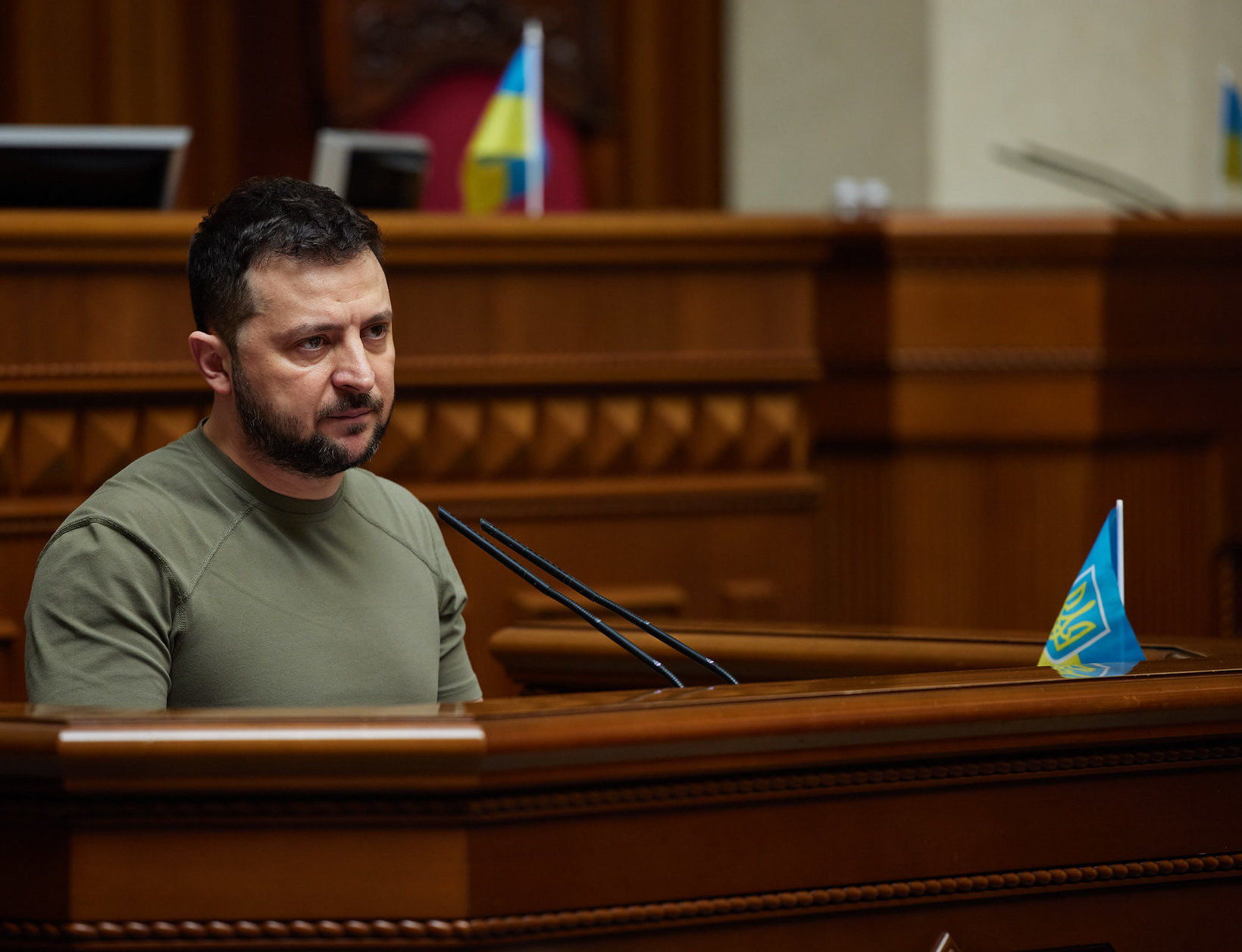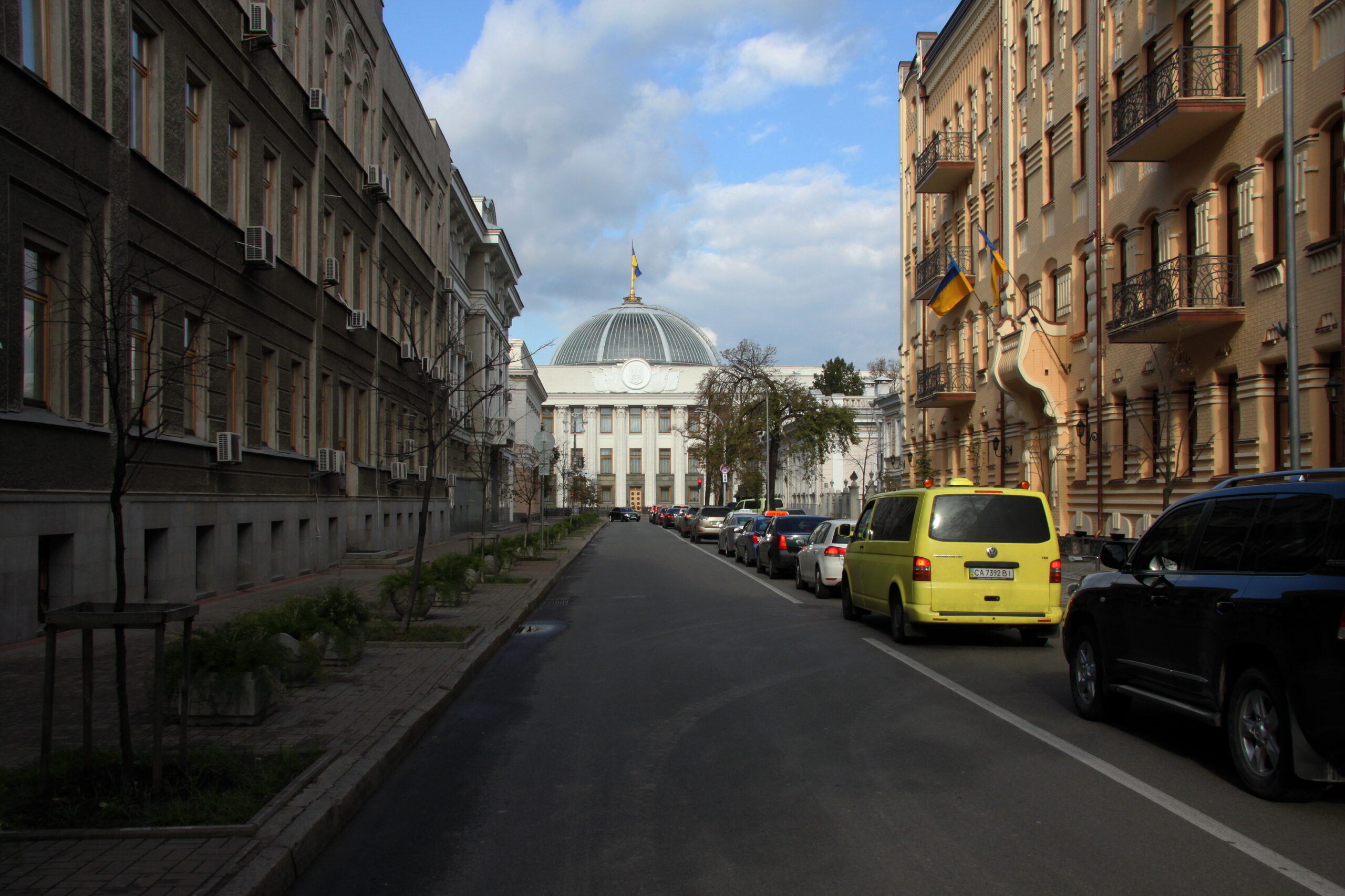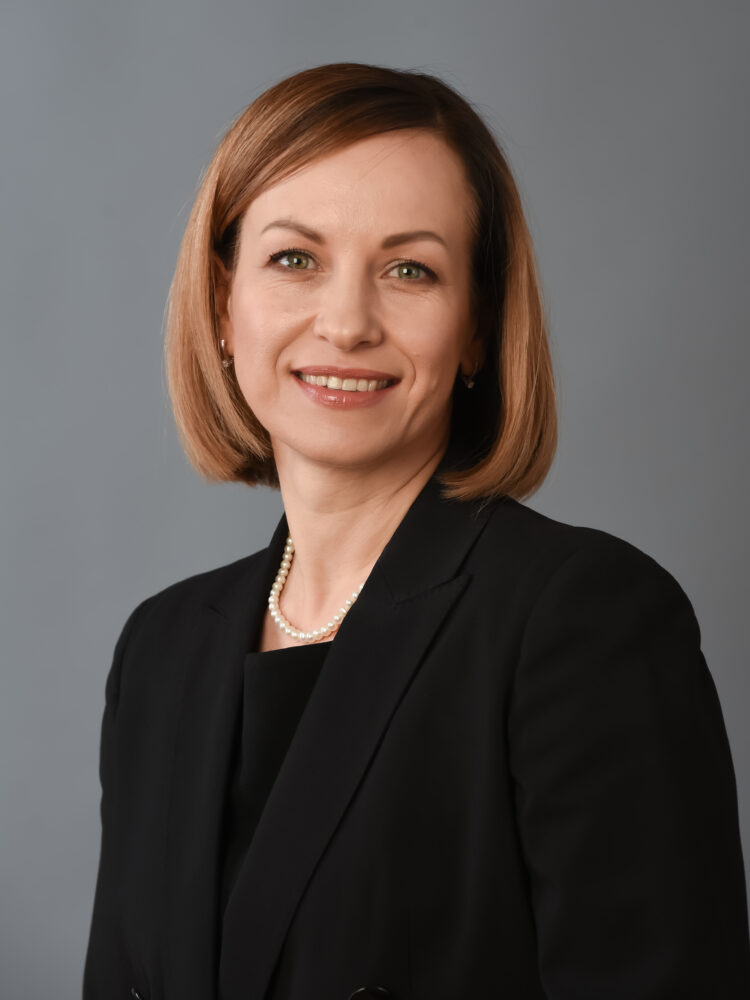Critics say merging Ukraine’s social insurance fund with the deficit-ridden state pension fund is the latest step in the radical restructuring of Ukraine’s socioeconomic policy in wartime.

Ukraine’s President Volodymyr Zelensky in May. (President Of Ukraine, Flickr, Public Domain)
Ukrainian government plans to merge its social benefits fund with its deficit-laden state pension fund could risk a reduction in – or even an end to – workplace sickness and incapacity benefits, policy analysts and union leaders are warning.
“This merger will not lead to better social protection for Ukrainians, but more likely a reduction in it,” said Nataliia Lomonosova, a social policy analyst at Ukrainian think tank Cedos.
The plan, already approved by parliament and now set to be signed into law by President Volodymyr Zelenskyi, is to merge Ukraine’s social insurance and pension funds, in an effort to deal with a serious shortfall in the social insurance fund and streamline the administration of welfare payments has been criticised, especially by trade unions in Europe and elsewhere.
Critics say it’s the latest step in the radical restructuring of Ukraine’s socioeconomic policy in wartime.
Plans to merge the social benefits and pension funds had been drafted before Russia’s Feb. 24 invasion, despite opposition from Ukraine’s minister of social policy, Maryna Lazebna. She resigned this summer.
The merger “looks like part of a larger plan, and one that is designed to cut [state] spending on social protection”, Lomonosova told openDemocracy.
Inside the country, opposition MPs and trade unions have spoken against the merger, claiming it violates best practice in the European Union. Trade union representatives sit on the board of the social insurance fund, and are involved in its management.
Proponents of the merger claim Ukraine needs to cut down its financial obligations to citizens, given the destruction of the country’s economy caused by Russia’s invasion. They argue private insurers could take on the role of state welfare.
Social Insurance Fund’s Huge Deficit
Ukraine’s social insurance fund provides support payments to citizens who temporarily cannot work because of illness, maternity leave, disability, workplace accidents or other conditions arising from the workplace. It also provides medical and social services to those who pay social contributions, whether via their employer or as a self-employed person.
A not-for-profit institution, it is managed equally by representatives of the state, employers and trade unions (representing employees). It has offices across the country and more than 5,200 employees.
Donate Today to CN’s
2022 Fall Fund Drive
The institution’s income is not part of the Ukrainian state budget. Instead, it is financed via social security payments known as the “unified social contribution,” which are taken from individual salaries.
But the ongoing effects of the coronavirus pandemic, as well as Russia’s invasion, have left the fund with a huge deficit, as more than 3 million people called on state assistance during 2021, with approximately 16 billion hryvnia (£390m) issued in sick pay to Ukrainians.
Last year, the fund’s deficit exceeded 2 billion hryvnia (£48m) and the shortfall had to be taken from the state budget. This has also led to delays in paying sick leave, maternity benefits and interruptions in other social benefits.
So far this year, 1.75 million people have turned to the fund for assistance and made 9.6 billion hryvnia (£230m) in payments to Ukrainian citizens. But there have been significant delays: according to the fund’s own data, at the end of September, many regions were facing a three-month delay in paying benefits.
Natalia Zemlyanska, a trade union official who sits on the fund’s board, told openDemocracy the fund’s finances began to suffer some years ago, after the government reduced the percentage that people had to pay from their salaries towards social insurance. Huge Covid -19 payouts since 2020 have only exacerbated the financial problems.
For Zemlyanska, the merger risks the collapse of Ukraine’s social insurance system — and could threaten the future of thousands of individual cases where people require and are entitled to state assistance.
“Why destroy something that worked anyway?” she asks.
Rival Proposals

View of Ukraine’s Parliament building in 2013. (Wadco2, CC BY-SA 3.0. Wikimedia Commons)
Prior to the war, Ukraine’s Ministry of Social Policy under Maryna Lazebna and the Ukrainian parliament’s committee on social policy, headed by Halyna Tretiakova MP, both proposed alternative reforms to the social insurance fund, in an attempt to solve the institution’s financial problems.
The committee proposed the merger with the state pension fund, which, they argued, would save at least 2-to-3 billion hryvnia (£48-£72m) in administrative costs (e.g. by firing significant numbers of fund personnel) and also permit greater oversight of expenditure and lead to more efficient payment schedules. The deficit in Ukraine’s state pension fund is such that, in 2020, the government claimed the state would no longer be able to pay pensions unless “decisive measures” were taken.
The ministry, however, focused on improving the efficiency of the fund: it wanted to digitise its services, strengthen the state’s role in managing it and make a minor increase to the insurance burden on Ukrainian employers, forcing them to raise the number of paid sick days they offer from five to seven. It opposed Tretiakova’s plans, citing legal shortcomings.

Maryna Lazebna, former social minister of Ukraine. (CC BY-SA 4.0, Wikimedia Commons)
The situation changed dramatically in July, when Lazebna, the minister of social policy, suddenly resigned — without giving any reasons. Shortly afterwards, the ministry changed its position and announced its support for the committee’s initiative on merging the two funds.
Last month, MPs from the ruling Servant of the People party voted to liquidate the social insurance fund and transfer its functions and assets to the pension fund.
Neither Lazebna nor Tretiakova responded to openDemocracy’s requests for comment.
For analyst Nataliia Lomonosova, the merger raises questions about how the state will be able to deal with payouts during Russia’s war against Ukraine.
“The number of individuals who will claim insurance payouts during wartime is only going to rise. This means the administrative burden will inevitably rise, so it’s incredible to radically reduce the number of people working for the social insurance fund in these conditions,” she said.
Lomonosova noted that the Ukrainian government is about to re-examine its obligations to Ukrainian citizens in terms of social security and welfare, on the basis that the “state should not have any unfinanced social obligations.” The World Bank has predicted Ukraine’s economy will shrink by 35 percent as a result of the Russian invasion this year.
“In practice, [the government’s plans] can only mean one thing: a reduction in [social] obligations,” Lomonosova said.
Hello to Private Insurance
Beyond the direct effects of the merger, Ukrainian trade unions are also concerned that it paves the way for the introduction of private insurance funds as a way to provide workplace sickness and accident benefits.
In fact, Tretiakova, head of social policy for the ruling Servant of the People Party, mooted the idea of attracting private funds to social insurance back in January 2020 — part of a wider effort to move away from Ukraine’s Soviet legacy in state provision.
“The decommunisation of the social insurance system will lead the fund to international standards of financial accountability, and create an opportunity to move to private insurance,” Tretiakova said, noting that “private insurers can be attracted on competitive terms.”
Unlike the social insurance fund, private insurance funds do not have representatives from the state, trade unions and employers. Moreover, the former’s financial assets are public and accountable. In recent years, a number of private insurers in Ukraine have gone bankrupt, and with inflation in Ukraine currently at 30 percent, their ability to provide payouts could be limited.
In July, Tretiakova expanded on these plans during a meeting of the parliamentary committee on social policy.
“The employer can purchase its coverage, its responsibility to the employee, either from the state or from the private sector. But the private sector will give a fair price for such insurance,” Tretiakova said.
Volodymyr Saenko, deputy head of the Federation of Trade Unions of Ukraine, described these efforts as “nothing more than lobbying the interests of private insurance companies.”
Response of Trade Unions
The merger plan comes as the Ukrainian government is preparing to move away from state provision and regulation in socio-economic policy.
This summer, the country’s ruling party forced through an agenda of radical labour deregulation — without consulting trade unions or referring to legal advice provided by the European Union and the International Labor Organization (ILO).

Headquarters building of the International Labour Organization in Geneva. (Steiner SA, ILO, Flickr, CC BY-NC-ND 2.0)
Those new laws, governing labour protections at small and medium enterprises, are deemed to violate E.U. norms and ILO conventions. Supporters argue that they are necessary to improve the business climate and reduce the bureaucratic burdens associated with hiring and firing.
In August, social policy chief Tretiakova claimed that the ILO, a U.N. agency, was a barrier to Ukrainians striking individual employment agreements and protecting their employment rights through more flexible means.
“We have to re-examine the obligations of the state, and they have to match the capacity of the state at this specific historical moment,” Tretiakova told openDemocracy.
The government and ruling party’s reforms have long set them on a collision course with Ukraine’s trade unions, which cannot use traditional methods of action, such as mass protests and strikes, during wartime.
Mykhailo Volynets MP, head of the Confederation of Free Trade Unions, and Yulia Tymoshenko, leader of the opposition Batkivshchyna Party, told openDemocracy they had recently met with representatives of the ILO and global trade unions. Batkivshchyna opposed the social insurance-pension fund merger.
“We informed them about violations of ILO conventions, the Association Agreement with the E.U., E.U. directives when the Ukrainian parliament adopted a number of bills that infringe on labour and trade union rights,” Volynets said.
“Everyone is concerned that the adoption of such laws could negatively affect the image of Ukraine and slow down its adoption into the E.U.,” he added.
Halyna Tretiakova MP, who backs the merger, recently told parliament that “E.U. directives do not dictate how any country should organise its system of social insurance.”
“I don’t think we should allow external management in our country,” Tretiakova said.
The merger of the two funds is now set to be signed into law by President Volodymyr Zelensky. If it goes ahead, it will come into effect in January 2023.
Serhiy Guz is a Ukrainian journalist and one of the founders of the country’s journalism trade union movement. He headed Ukraine’s independent media union between 2004 and 2008, and is currently a member of Ukraine’s Commission on Journalistic Ethics, a self-regulation body for the country’s media. He is also a council member of the Voice of Nature NGO and editor-in-chief of The Clever City Kamianske newspaper.
This article is from openDemocracy.
Donate Today to CN’s
2022 Fall Fund Drive
Donate securely by credit card or check by clicking the red button:

Zelensky has said that he needs foreign money to pay for pensions and many other things.
Pensions, yes, healthcare, yes, things for the quality of life, yes, but not another penny for his war machine or for NATO tentacles to strangle the Ukrainian people for the sake of the US to control the world, starting with “dismantling” the Russian Federation.
Totally wrong, RC29!
I remember hearing Dr. Michael Parenti speaking to Professor Peter Phillips and Mickey Huff of ‘Project Censored’ in 2014 after the US led coup, discussing the situation in Ukraine. Parenti said, as best as I can remember, “Just wait until the IMF gets into Ukraine. If they think they have it bad now, they’re in for a surprise!” Words to that effect, and my apologies to the Professor, a long-time hero of mine, if I misquoted him.
This very good and timely article proves Parenti correct!
First of all, it wasn’t a Russian “invasion” but an intervention to FINALLY protect the Russian Ukrainians in the southeastern part of that nation from the perpetual bombardment by the Ukrainian Nazis since 2014, supported by the United States and the subservient vassals of NATO, which big mainstream corporate media, refused to cover. I wonder why?
I feel sorry for the Ukrainian working-class, as they are caught in the middle and are having all of their hard-earned benefits which they’ve worked for reduced and possibly eliminated because of a corrupt, “international banker” and capitalist scheme of privatization!
Billions or hundreds of millions for the “Death and Destruction” industry (military hardware and supplies) should be used to fund the accounts of the social programs in what the author, Mr. Guz has written about. A more humane and productive use of money.
I hope that this is some sort of joke. To consider Ukraine as some sort of sane society under Zelinsky/UK/ CIA/ Western madness/ Nazi influence/removal of opposition parties/ reliance on billions in “aid”/ call ups of vast numbers of ill-trained citizens to be thrown against well-prepared Russian forces/propaganda of hatred against Russia/ refusal of any compromise on NATO which pretends to be defensive is not rational. All this shows what the world has known for years but recently has been completely changed by the massive burden of lies and hatred taken on by the “Western” media and it seems, all the governments of the “free world”!! Ignorant westerners who could easily have kept up with the news over the last few years seem to have decided that Russia for no reason and with no motive had suddenly decided to invade poor darling democratic, well-run, civilized (white people!) Ukraine on Feb 24 2022.
Servant of the People Party is merely a sick joke. On the other hand I have zero sympathy for the Ukraine (or the US for that matter, our day will come). They were monumentally stupid, doing bad things that they were told Russia would eventually put a stop to. But then again, when they separated from the RF, they were one of the few SSRs to be in good shape. The Ukrainians spent the next 25 years industriously tearing it apart so that by the time the US/EU fomented their coup, it was the poorest nation in Europe. And they were stupid enough to think that they could tap the EU like they tapped mother Russia when they were still in the USSR. SUPPLIES! And they are slavishly following the US in this move. The Republicans want to rob Medicare/SS to pay for our wars. That’s what the Kiev regime is doing here. Considering the US’s statistics – at the bottom of most social measures for societies, third world level income disparities, sagging life expectancy, high infant mortality rates, etc etc, – you’d think that everybody would realize that the US is not the model to follow. But apparently you’d be wrong. The last man standing will be the Nordic social democracies.
The Ukrainian government should apply to that of the Americans since it is they who are providing the ammunition to continue the fight. Since it is the Americans who are supporting the war effort, surely some of that dough should be used to support their social contract.
I have a much better suggestion…American tax payers’ money to be used in America and for Americans. Charity starts at home.
While not commenting on the rights or wrongs of the merger proposal, is it any wonder Ukraine’s finances are under strain, another consequence of Putin’s illegal invasion. I am ver pleased to see him being given a blood nose and would like to see him driven out of all of his illegally acquired territories.
By that rationale, the US ought to give back Hawaii, Puerto Rico, half of Mexico, most Pacific Islands, and remove it occupation forces from Japan, Australia, Germany, Gitmo, and more. There are many more. Reparations are due. Law does not matter to the US, that’s why they began using the term “rules based international order” instead of “international law”. Orwellian nonsense.
The US illegally invaded and/or regime changed so many nations, whether democratic or not, and supports most of the world’s dictators as long as that is profitable for the oligarchs. Millions killed in Korea, Vietnam, Laos, Cambodia, Iraq, Afghanistan, Libya, Syria, South and Central America, and more and more. The US is still drone bombing people in Somalia and all across the world.
Legal, is not in the US vocabulary when it comes to foreign policy.
The Ukrainians who have have their government illegally coup’d, who rejected the resulting racist, nationalist far-right regimes, have been shelled for 8-9 years now, have voted to say f* this nonsense, we’ll go with the nation which is “finally” trying to protect us as well as themselves.
The US hates democracy, that’s why whenever imperial capitalism and democracy clash, democracy is discarded.
I would like to see the US driven out of all of it’s illegally acquired territories, with the net result of greater freedom and self determination for the peoples of the world.
It seems that the Russians and Ukrainians living under the Russian government now are better off than before.
The first thing W.W. Putin did was paying out their pensions.
Whereas Mr. Zelinskij seems to be a billionare with luxery estates in Florida and Israel to name a few.
You seem to forget the power the IMF has when it comes to complying with terms of money assistance. The Western creditors will swoop in like vultures. Poor Ukrainians…IMF = Instant Misery Follows
When Zionist occupiers of Palestine will be driven out of all of his illegally acquired territories? Acquired without ANY referendum, of course, but with FULL backing of NATO, just like NATO’s backing of Neo-Nazi Banderite Ukraine rulers?